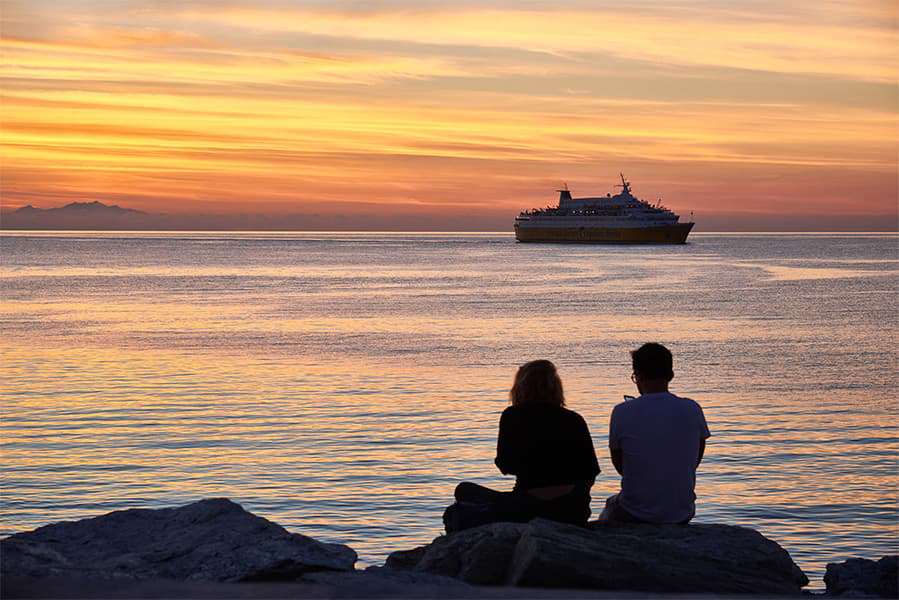Salina – Vulcano
Ferry to Aeolian Islands
Salina – Vulcano
Ferry to Aeolian Islands

Depending on the season their are usually 13 daily and 89 weekly sailings between Salina and Vulcano. 2 ferry operators provide the ferries from Salina to Vulcano, Liberty Lines Fast Ferries & Siremar. Salina Vulcano ferries take around 45 minutes. The ferry costs between $35.14 and $171.88, depending on ticket details. Prices exclude any service fees. Ferry timetables change seasonally, use our Deal Finder to get live pricing and availability for ferries from Salina to Vulcano.
The earliest Salina Vulcano ferry typically departs Salina at about 01:00 and the last ferry usually leaves at 19:30.
Ferries from Salina to Vulcano sail in around 45 minutes. The fastest ferry is approximately 40 minutes. Ferry duration can vary by ferry provider and can be impacted by weather conditions.
There is 89 weekly sailings from Salina to Vulcano provided by Liberty Lines Fast Ferries & Siremar. Timetables can change from season to season.
Liberty Lines Fast Ferries provide 81 sailings weekly. Siremar provide 10 sailings weekly.
The price of a ferry from Salina to Vulcano typically range between $35.14* and $171.88*. On average the Salina Vulcano ferry is $77.06*. The cheapest Salina Vulcano ferry prices start from $35.14*. The average price for a foot passenger is $82.50*. The average price for a car is $309.58*.
Pricing will vary depending on number of passengers, vehicle type, route and sailing times. Pricing is taken from searches over last 30 days and exclusive of service fees, last updated 1 April 2025.
The distance between Salina to Vulcano is approximately 11 miles (18km) or 10 nautical miles.
Yes, Salina Vulcano ferries allow cars onboard with Siremar between Salina and Vulcano. To view car ferry tickets and prices between Salina and Vulcano use our Deal Finder.
Liberty Lines Fast Ferries & Siremar allow foot passengers on Salina Vulcano ferries.
Liberty Lines Fast Ferries allow pets on ferries from Salina to Vulcano. Please also note that your pet may have to stay in the vehicle during the journey.
More routes than anyone else.

Compare fares, times & routes in one place.
Change plans easily with flexi tickets.

Book e-tickets & manage trips in-app.
Live ship tracking & real-time updates.

Top-rated customer support when you need it.
Forming one of the Aeolian group of islands, Salina lies just to the north of Sicily and is the second largest island in the archipelago. The island is divided into three distinct areas. Santa Marina which is on the eastern coast, Malfi in the north and Leni in the south west. With a history that can be traced back to the 4th century, Salina began as a Greek settlement which at the time was called Didyme, which is a Greek name that means "twins" in reference to the two mountains on the island. However, the island was inhabited as far back as the Bronze Age and since then has been developed and abandoned many times. The island is popular with visitors and one of the most popular sights is the salt lake at Lingua which was once the site for the production of sea salt, hence the name Salina ("salt mill" in Italian). Also popular attractions are the Roman tombs that are located on the slopes of Fossa and the Sanctuary of the Madonna del Terzito, located between Malfi and Leni. This is the religious centre of the island and attracts many pilgrims on the main feast day of July 23rd each year.
Salina has two ports, Santa Marina and Rinella, served by ferries and hydrofoils from Hydrofoil service is active from Naples, Palermo, Reggio Calabria, Messina and Milazzo.
The small Italian island of Vulcano lies in the Tyrrhenian Sea and is roughly 25 km off the coast of the island of Sicily. It is the southernmost of the eight islands that make up the Aeolian group of islands. The island has a number of volcanic centres, including one of four active, non-submarine, volcanoes in Italy. The most recent volcanic activity on the island was at the Gran Cratere at the top of the Fossa Cone, with the cone having grown in the Lentia Caldera in the middle of the island, and has had around 9 major eruptions in the last 6,000 years. However, since the eruption of the Fossa Cone between 1888 and 1890, which deposited around 5 meters of material on the summit, the island has been quiet. For the brave, visitors are able to walk to the crater of a volcano where you can observe smoke coming out of the ground! Apart from the volcanos the island is popular with tourists because of its hot springs which are only a short walk from the island's harbour.